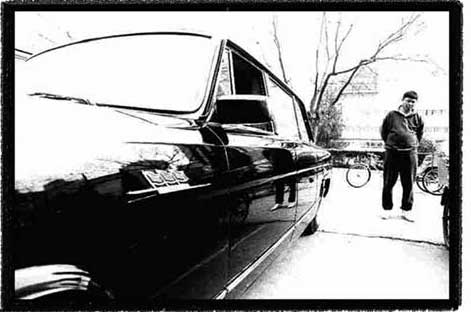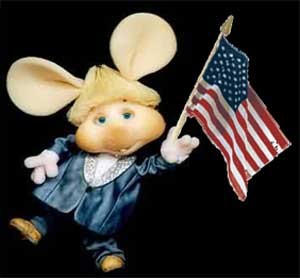
Fifteen years ago a Beijinger eyes a Hong Qi (Red Flag), the Chinese built limo that only the privileged used to be able to afford. These days he might be ogling an SUV.
©1990, UrbisMedia
Recently, the Chinese oil company, CNOOC, made a bid to acquire America’s Unocal; the equivalent of the “yellow peril” coming to siphon gas out of our SUVs. Never mind the dangers of those Silkworm missiles, this is like sneaking in and abducting our daughters (well, maybe our sons; the Chinese are not big on daughters). Next thing you know they’ll be after GM and the Hummer will be called the “Commie.”
This is, of course, an occasion, for some good ole China-bashing in Washington. The Chinese are already accused of eating our lunch with their undervalued yuan, and now this, a strike at the very heart of what it means to be an American—to be able to drive your car where and as far as you like and fill your tank at will. But now the Chinese want to be just like us (isn’t this what we wished for?) and there is going to be a price to pay for it, and not just at the pump.
I kind of had an inkling of this when I was lecturing in Beijing a couple of years ago. The driver who took me around in a Jeep Cherokee that was made right in the Jeep plant outside of Bejing (Buick’s are made in Shanghai) drove with a Marlboro (Hey, aren’t those our cigarettes?!) hanging out of his mouth, adding to the 3-pack-a-day Bejing air. I was already amazed at how much cars had replaced the formerly ubiquitous bicycles and tricycles of Beijing streets in the years I had been going there. We were riding on the 5th “ring road,” which had been completed a few months before, and it already was filled with traffic and looked like a New Jersey Turnpike after a long hard winter. [1] My “minder,” cited the increase in traffic as an index of China’s rising prosperity.
He had a point. The car is an index of rising prosperity, but not just because there are more people who can afford them. American’s should be able to appreciate this more that anyone. I used to upset some of my anti-automobile students when I argued that the car made the American home-owning middle-class, hence, the car is at the center of the American Dream. Planners were supposed to hate cars and love mass transit, and this didn’t fit the profile.
But it’s true: what we call urban sprawl today, the “burbs,” or the metropolitanized urban area, was shaped by the car. The car opened up vast areas for development (roads were cheaper than rail lines) and drove down the average price of land in urban areas. Single-family homes could be built more affordably, the car could get you to a from work, the taxes you paid for public services made your home increase in value and – Voila!, thank the Ford Almighty! – you’re in the middle class. Not that there haven’t been problems and negative side effects (which I will go into in subsequent essays on this subject).
And that’s what the Chinese want, whether they know it or not, and they are going to need a lot more ring roads and a lot more gasoline to get there. The scary thing is that they seem to be amassing the economic power to get into second gear and, as always when speaking of the Chinese, there are so damned many of them!
Is it any wonder that crude is nudging $60/barrel?
The political answer will be to shift some of the blame onto the Chinese, a convenience that will only disguise the fact that the Bush administration is nearly as profligate and criminally negligent about addressing this problem as it has been with its egregiously screwed-up notions of cluster-bombing democracy all over the Middle East. Mr. Boosh has done nothing to force the automobile industry to bring down the average miles-per-gallon of the gas-guzzlers plying our roads.
Americans have continually raised the American Dream Bar with unnecessarily bigger vehicles, more of them, and more varieties of them. Meanwhile, their American Dream is being outsourced, exported, and purchased under their very noses while their looking in the rear view mirror to see if the Joneses are acquiring more toys than they have.
But blaming the Chinese for our energy problems makes no more sense, or progress toward a solution, than blaming the yuan for our trade deficit problems, or immigrants for our unemployment, or same-sex marriage for screwing up the mythologized American family. These are troubles that start at home, and it seems that Mr. Boosh may have decided to become a democratic “nation builder” because it makes for a nice distraction from the fact that he can’t or won’t address the problems in his own back yard.
The Chinese have plenty of problems as well, but they have become, in more ways than one, the “capitalist roaders” they used to take out and shoot. Deng Xiao Peng used to like to say in defense of his notions of capitalism “with Chinese characteristics” that it “doesn’t matter whether the cat is black or white, as long as it catches the mouse.” These days America must be feeling a little bit like Topo Gigio.
 ___________________________________
___________________________________
©2005, James A. Clapp (UrbisMedia Ltd. Pub. 6.25.2005)
[1] Beijing ring roads owes something to the concentricity begun by the Forbidden City, which lies at the center of the city. Subsequent circumferential roads seem to ripple out to the ever expanding perimeter at somewhat orthogonal intervals from the former compound of the emperors.
